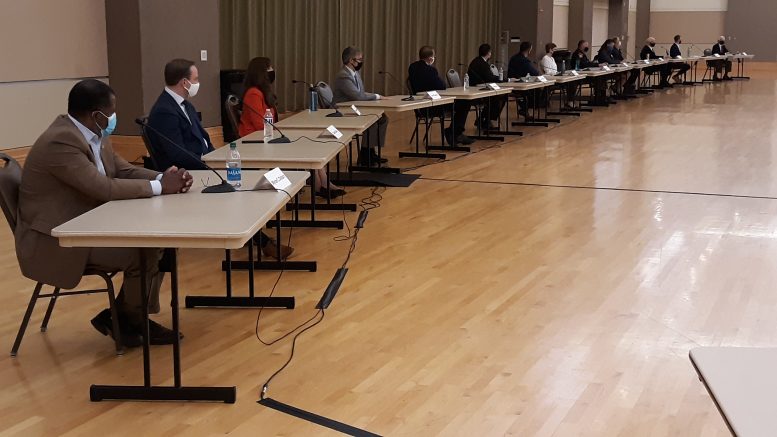By JAN LARSON McLAUGHLIN
BG Independent News
On the eve of early voting, 14 candidates who will appear on Wood County ballots answered questions at a forum Sunday evening at BGSU.
The candidates were spread out and masked, as were the few people in the audience. The two-hour forum, sponsored by the League of Women Voters and BGSU Votes, will be available for viewing at www.lwvbg.org, starting on Monday.
The only candidate refusing to sign a media release for the forum was James Matuszak, Republican candidate for the county recorder seat. Since the League of Women Voters didn’t want to appear biased, the Democratic incumbent Julie Baumgartner also was not permitted to participate.
The candidates had 90 seconds to answer questions, with some candidates getting more questions submitted to them from the public.
The most questions went to the candidates for the State Senate and State Representative seats.
Following are some of the questions and responses.
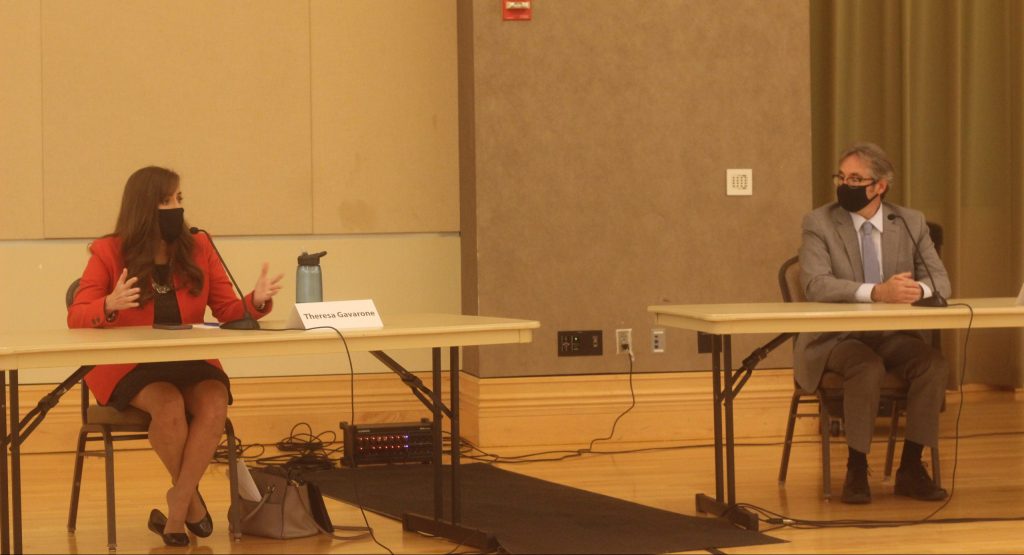
STATE SENATE RACE
Should H.B. 6, supporting two Ohio nuclear power plants with questionable funding, be retained, repealed or replaced?
Incumbent Theresa Gavarone, a Republican, said that one of the nuclear power plants (Davis Besse) is in her district. The plant is a “priority for my district,” employing thousands, she said. Nuclear energy currently makes up 90% of Ohio’s carbon-free energy, she added.
“It’s really important Davis Besse stays open,” Gavarone said.
Democratic opponent Joel O’Dorisio, who teaches at BGSU, said H.B. 6 should be repealed and replaced. It must not become normal business in Ohio to rescue businesses with a $60 million bribery and corruption scheme.
“I’m tired of paying a corruption tax for what is going on in our state,” O’Dorisio said.
Bailing out nuclear energy will result in extra energy fees for Ohio residents, he said.
How can Ohio implement a constitutionally compliant school funding system?
O’Dorisio said “we’ve known for 20 years the current way we fund schools is not compliant.”
Ohio needs to distribute funds fairly, and must realize that a quality education is necessary for getting good jobs.
Every child in Ohio deserves a good education,” O’Dorisio said.
Gavarone said “education must be among our highest priorities.” The state needs to make sure teachers have the resources they need, and that education is meeting the current workforce needs, she said.
There is legislation in the House right now that may help the school funding issue, Gavarone said.
Why does Ohio continue to waste money on voluntary incentives to agriculture to solve the manure run-off issue?
Gavarone said voluntary efforts by farmers have the best chance of having a lasting impact.
“Lake Erie is one of Ohio’s greatest resources,” she said. “We have put a lot of money in the H2O program. The best way to really work on this problem is to bring people together.”
O’Dorisio said he supports EPA policies for large farms, not just volunteer efforts to get agriculture to follow the rules.
“We’re allowing them to not treat the waste,” he said. “We can’t do that.”
He recommended a combination of incentives and regulations.
How can Ohio do a better job helping residents hit hardest by COVID-19?
O’Dorisio said entire swaths of the state’s population lost their jobs when COVID hit. The state enacted a moratorium on eviction, but offered no help with rent, he said.
Currently, one in four renters are behind in payments, and one in five children are experiencing food insecurity.
“We owe it to ourselves to invest in the people in our community,” O’Dorisio said.
As a business owner and as someone who lost a family member in Florida to COVID, Gavarone said she understands the losses being experienced.
“COVID-19 has been just awful,” she said. “I understand the impact first hand.”
Gavarone said she has been working to make sure Ohioans get the assistance they need during this “unprecedented time.”
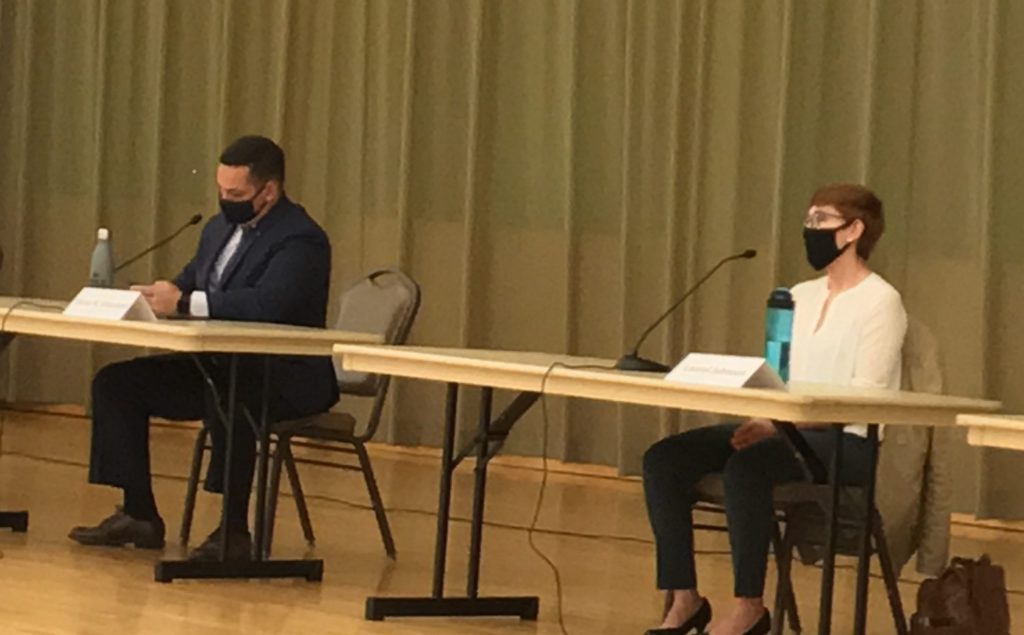
STATE HOUSE RACE
Should EdChoice be sending taxpayer money to private and parochial schools?
Republican Haraz Ghanbari, who was appointed to the House seat, said the state should not allow a child’s home to determine their learning potential. The state needs to make sure some students get additional services they need.
“Let our parents decide the best education route” for their children, he said.
Democrat Laurel Johnson, who is a medical marijuana dispensary agent, said public taxpayer money should not pay for private schooling.
“My belief is EdChoice is not constitutional,” she said. “I believe taxes should be used for public services.”
EdChoice “takes away from students who are educated in public schools,” Johnson said.
What is your position on H.B. 6, which removed incentives for renewable energy?
Johnson said she supports legislation to provide incentives for meeting green energy standards. “The bribery scandal aside, I did not believe it was good policy,” she said. “Clean energy is the way of the future.”
Rather than bailing out nuclear power, Ohio should retrain people for renewable energy efforts, she said.
Ghanbari said “the allegations surrounding H.B. 6 were quite concerning to me” and decisive action was taken to remove House Speaker Larry Householder from his leadership position.
But Ghanbari cautioned that Householder is innocent until proven guilty by a jury or judge.
As for H.B. 6, Ghanbari said he toured Davis Besse, and met with local officials from communities like Bowling Green that had invested a lot in green energy. He warned about the lasting effects of mothballing an industry like Davis Besse.
What will you do to combat gerrymandering in Ohio?
“I have full faith and confidence in our Secretary of State,” Ghanbari said.
As for redistricting in the future, Ghanbari said it’s important to listen and learn to make sure there is fair representation.
“We need to make sure we have fair elections,” he said.
Johnson said she supports the non-partisan redrawing of district maps.
“Gerrymandering is a huge problem in Ohio at the state and federal levels,” she said. “Ohio is not as red as it has been drawn to be.”
Ohio is close to 50/50 for Republicans and Democrats, yet two-thirds of the state is districted to make it likely to elect Republicans, with the same being true for three-quarters at the national level, she said.
How would you work to update hate crime laws?
Johnson said the U.S. needs to come together as a nation to “acknowledge that racism is a public health issue.” She pointed out President Donald Trump’s statements which have “all but encouraged” acts of racism and hatred.
Johnson said she supports tougher punishment for hate crimes, and the holding of town hall meetings to listen to people of color facing discrimination.
Ghanbari said he has faced discriminatory behavior himself.
“As the son of an immigrant from Iran, I have been on the receiving end,” he said.
When the protests started to occur around the country, Ghanbari said he talked with protesters in Columbus.
“What can we do to come together? We must acknowledge what has happened in the past, but we can’t just hold onto the past,” he said.
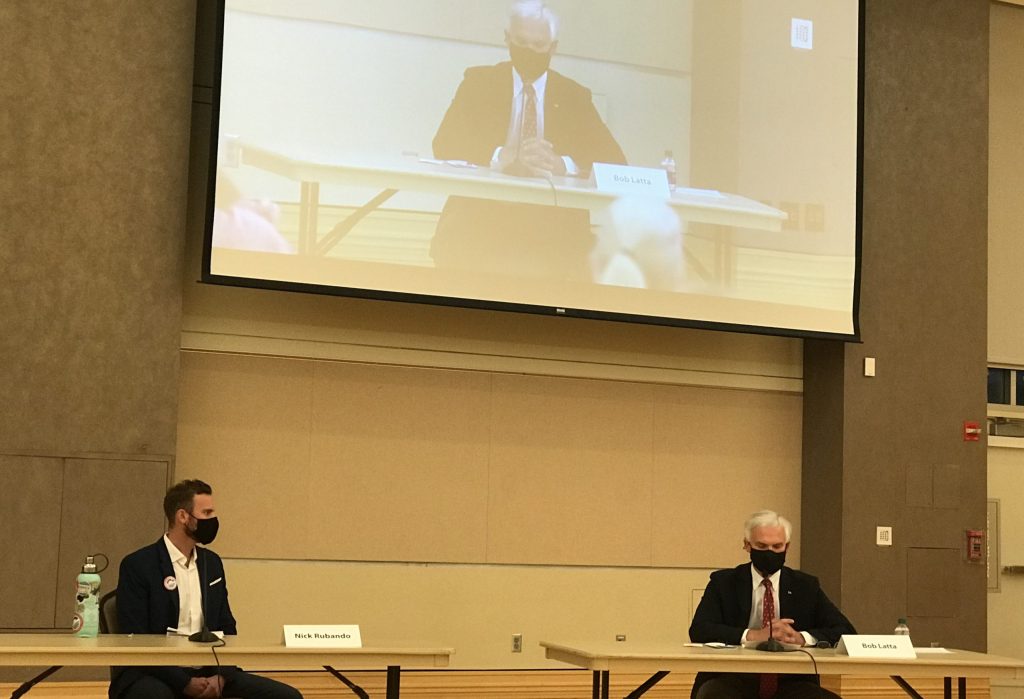
CONGRESSIONAL RACE
How would you help expand and improve health care coverage for Americans?
Democratic candidate Nick Rubando said efforts are currently underway in the Supreme Court to end health care for many Americans. There are an estimated 300,000 residents in Ohio’s Fifth District with pre-existing conditions, who are at risk of losing coverage.
Rubando said he sees “health care coverage as a human right.”
He wants to expand health care rights, while Latta “wants to rip them away,” Rubando said.
Republican incumbent Bob Latta said the single-payer system will cost 150 million Americans their health care. Latta said he supports patient-centered care with choice, and said he wants to make sure people with pre-existing conditions are not harmed by future plans.
Why is the U.S. doing worse handling COVID than any other developed countries?
Latta blamed the Chinese government for not being forthcoming about the virus.
“We wouldn’t be in this situation if the Chinese let us know what was going on,” he said.
Latta mentioned the federal efforts to help with the development of therapeutic and diagnostic tools, and the amount of money in the CARES funding. He is hopeful that a vaccine may be found before Christmas.
Latta also talked about the Chinese buying up personal protective equipment before other countries knew there was a need. And he applauded local companies who responded by making PPE.
Rubando criticized the top levels of U.S. government for not taking the coronavirus seriously. He pointed out Trump’s taped statements in March about his efforts to downplay the threat. Meanwhile more than 200,000 Americans have died from COVID.
‘“I really think this comes from the top down,” he said.
Rubando also talked about the efforts before the Supreme Court to repeal the Affordable Care Act – during a pandemic.
Would you commit to having town hall type meetings?
“Yes, I 100% commit to having in-person town halls,” Rubando said. “I think our representatives should be accountable to the people.”
Town hall meetings have been “lacking in the district, year after year, after year,” he said.
Such meetings are the “bedrock of our democracy,” Rubando said.
Latta said he has held 130 “courthouse conferences” since being elected to Congress. The meetings allow people to meet with him individually, with no time limits.
He did not commit to holding town hall meetings.
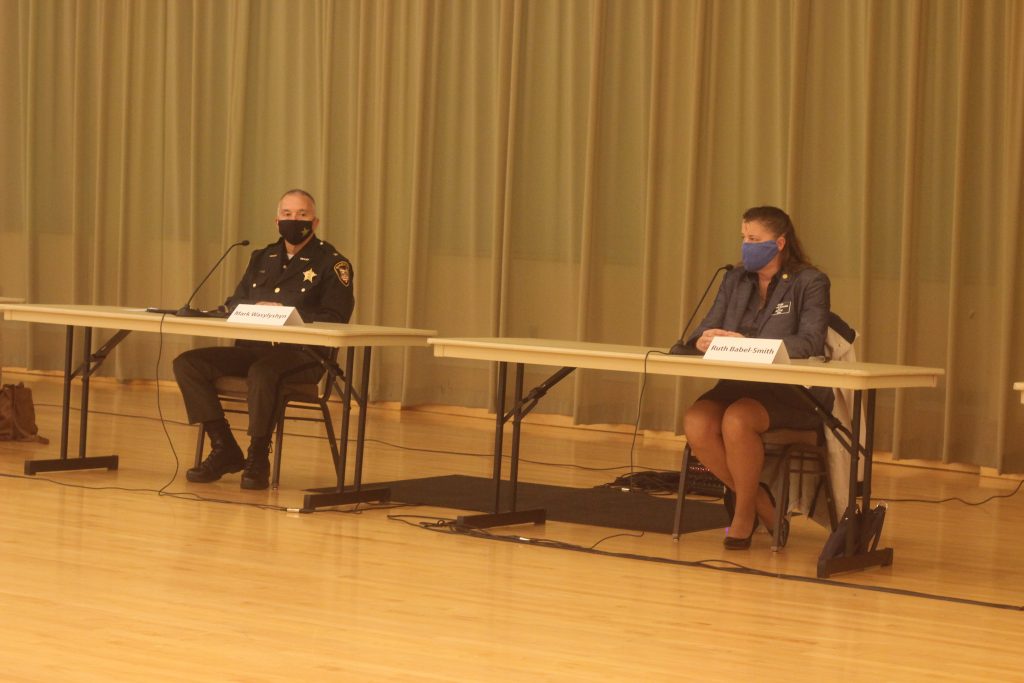
WOOD COUNTY SHERIFF
What is the most important change that can be made to decrease implicit bias toward minorities?
Sheriff Mark Wasylyshyn, a Republican who has held his position since 2005, said that accountability and transparency are vital. The sheriff’s office has dash cams and GPS in all cruisers, plus was the first law enforcement agency in the region to get body cameras.
“We also hire people with a public service mentality,” Wasylyshyn said.
The sheriff said his department is very accessible, having a presence at several community events.
Democratic contender Ruth Babel-Smith, who retired from the sheriff’s office and now teaches law enforcement courses at Owens Community College, suggested that sheriff’s office policies and procedures should be available on the agency’s website.
“Law enforcement has really been getting some negative press lately,” she said. “Several officers have lost sight” of their duties.
Babel-Smith said she would invite the public to be part of hiring and promotion processes, plus have open conversations with community groups.
How do you ensure proper training for employees handling domestic violence and mental health issues?
Babel-Smith said the backbone of any training program should be good trainers. She would welcome people in the mental health field to evaluate trainings, and invite them to participate in crisis situations.
Wasylyshyn said his department has significantly increased training.
“It really does come down to accountability and transparency,” he said.
All deputies must have training in de-escalation techniques and dealing with people in mental health crises.
Wasylyshyn also said the jail has several cameras, and has received 100% ratings for Ohio standards.
WOOD COUNTY COMMISSIONER
What are the significant problems facing Wood County?
Democratic challenger Bruce Jeffers, who is a retired teacher and former Bowling Green City Council member, said economic development is the biggest issue. All growth isn’t necessarily good, he said.
“It might be good, but we’ve got to make sure we count all the costs,” Jeffers said.
He noted Bowling Green’s economic development efforts that didn’t hurt the city budget.
“When we make deals with companies coming into the county, we have to make sure we aren’t getting the short end of the stick,” Jeffers said.
Incumbent Republican Dr. Ted Bowlus, who practices podiatric medicine, said the COVID-19 pandemic is the biggest challenge facing the county.
Bowlus said he is starting a “Focus on the Future” effort to mitigate the economic impact and health problems associated with the next pandemic.
How can the commissioners improve communication with the large geographic area in the county?
Bowlus talked about the frequent conference calls the commissioners hosted with other elected officials in the county about the coronavirus.
“I consider communication very important,” he said. “We learned a lot from this virus.”
Bowlus mentioned that he attended an “Open Ohio Rally” earlier this year. “We have to find out both sides of the issue,” he said.
Jeffers said it is important for the commissioners to convey the same messages as the governor, Ohio Department of Health and the Wood County Health Department about COVID precautions.
“We need to make sure that we’re talking with a clear voice,” he said. “I really don’t understand why Ted went to an ‘Open Ohio Rally’ in May.”
The commissioners should not be sending mixed messages and “need to support the experts on this issue,” Jeffers said.
WOOD COUNTY COMMON PLEAS COURT JUDGE
What type of volunteer and community service are you involved in?
Republican Corey Speweik said he has held several positions with the Wood County Bar Association, and serves on the Wood County Alcohol, Drug Abuse and Mental Health Services Board, Alicia’s Voice board, and the Eastwood Community Improvement Association.
Democrat Joel Kuhlman said as an attorney at a small law firm, “most of the work we do is community service and it’s not paid.” The clients have little money, and “they have a need that needs to be met.”
Kuhlman said he also serves on the Eastwood Educational Foundation, and a program that raises money to help students financially.
What factors are used in determining bail for defendants?
Kuhlman said the judge must look at the impact to the community. “The primary consideration is if the person is violent,” he said.
If done properly, bail can reduce the need for housing so many inmates in the jail, Kuhlman said.
“The issue of bail is a pretty hot topic in the legal community,” Speweik said.
As judge, he would consider recidivism, the safety of the community and victim, the ability of the defendant to pay bail, and the likelihood of the person returning to court.
“Bail isn’t designed to punish someone,” Speweik said.
6th DISTRICT COURT OF APPEALS
What forms of volunteer and community service have you been involved in?
Myron Duhart, a general division judge since 2011, said volunteer work “has been a hallmark of my life and my career.”
A veteran, Duhart has served on the Mercy Health Systems Board, Salvation Army board, Frederick Douglass Community Center board, and is vice president of the Toledo Bar Association.
Duhart said he has always believed, “those who have been given great privilege are required to give back.”
Charles Sulek, a litigation attorney with Eastman and Smith, said he is involved with the Toledo Bar Association, the Federalist Society, and church. He said he is teaching his children that it’s “important to stand up and serve.”
How should a judge familiarize himself with unfamiliar areas of the law?
Sulek said that as a judicial attorney at the Ohio Supreme Court, his experiences have prepared him well for areas of the law.
Duhart, who has been a judge for almost a decade, said a judge must prepare, but always be open and receptive to arguments from counsel.
“Experience is critical. Education is critical. Preparation is key,” he said.
All the candidates were given a chance to make a closing statement.
Duhart asked that voters do their research before casting their ballots. “Don’t forget the judges. Judges matter,” he said.
Sulek said he would “follow the Constitution,” not rewrite it. “Judicial philosophy is important,” he said.
Gavarone noted her track record of working in a bipartisan manner.
“Experience matters as we maneuver through and get to the other side of this,” she said of the pandemic.
O’Dorisio said he decided to run for office because of the increasing cost of education.
“I know that we can make changes working together,” he said. “We need to refocus away from power and corruption, and prioritize the people who make up our economy.”
Speweik said he “supports the Constitution.” As chief legal officer for five villages, and former Perrysburg prosecutor, he has experience in many types of cases, including real estate and pipeline matters.
“We need judges who can hit the ground running,” Speweik said.
Kuhlman said he has experience resolving conflicts in law. He pointed out his work as a former Wood County commissioner and Bowling Green City Council member.
“I was able to arrive at fair and reasonable solutions,” Kuhlman said.
Ghanbari said that after nearly 20 years of military service, he is concerned about the current state of “law and order” across the nation. He supports the men and women in uniform, and fully funded police.
“It’s paramount that we have a community where folks feel safe,” he said.
Johnson said she would “truly listen to the struggles that people in our community face.”
“We have suffered through leaders at the state level” who have ignored the needs of the people, she said.
Johnson said she believes in funding public education, providing quality health care, and protecting the environment.
Wasylyshyn said he is the longest serving sheriff in Wood County, and considers the residents his bosses.
“I work directly for the people,” he said.
The sheriff is head of the county 911 system, which gets more than 40,000 calls a year. Of those, 99% of the calls are answered within 10 seconds, and the other 1% are answered within 20 seconds.
And Wasylyshyn added, “all of my deputies must treat everybody with respect.”
Babel-Smith said local citizens don’t feel safe. “The citizens of Wood County have the right to feel safe in their homes,” she said. “The message I keep hearing is the same – they do not feel safe in their homes.”
Babel-Smith said it can take 30 to 45 minutes for deputies to respond to some areas of the county.
“Something has to change,” she said. “Public safety is my No. 1 concern.”
Jeffers talked about his experience in education and as a council member.
“I think that my experience is going to be very helpful in the commissioners office,” he said.
Jeffers promised to focus on hard-working families, farmers, county natural resources, and “to make sure everyone has a seat at the table.”
Bowlus noted the county’s record-setting economic growth, and the recovery of the general fund during COVID.
“We’re in good financial shape,” he said.
“When I see a problem, I ask questions, and I look for answers,” Bowlus said.
Rubando said Wood Countians can “vote for change” or continue being served in Congress by someone funded by big business PACs. He voiced his support for green energy, infrastructure improvements, and promised to be a champion for health care.
“I will work for working Ohioans,” Rubando said.
Latta said he has held more than 1,200 meetings in his district while in Congress. And he is ready to continue working for the district. “We have a lot of work to do,” he said.

